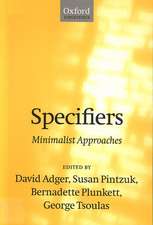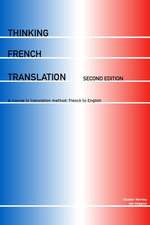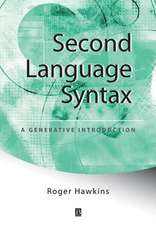New Directions in Language Learning Psychology: Second Language Learning and Teaching
Editat de Christina Gkonou, Dietmar Tatzl, Sarah Merceren Limba Engleză Paperback – 27 mar 2019
This book explores potential new directions in the growing field of language learning psychology. The individual chapters cover theoretical and conceptual developments and innovative methodological designs, while also exploring practical implications. Language learning psychology is a vibrant field of research that typically involves constructs from social and educational psychology, which it considers in terms of their relevance for the domain of language learning. The diverse theoretical and empirical chapters examine a range of familiar and lesser-known constructs, highlighting the importance of taking into account both learner and teacher psychologies, and recognising the complexity, dynamism and situatedness of psychological constructs, as well as the value of employing diverse research methodologies. It is hoped that these ‘new directions’ concerning populations, constructs and theoretical and methodological frameworks will pave the way for innovative future developments in this vibrant field.
| Toate formatele și edițiile | Preț | Express |
|---|---|---|
| Paperback (1) | 639.25 lei 6-8 săpt. | |
| Springer International Publishing – 27 mar 2019 | 639.25 lei 6-8 săpt. | |
| Hardback (1) | 645.47 lei 6-8 săpt. | |
| Springer International Publishing – 4 dec 2015 | 645.47 lei 6-8 săpt. |
Din seria Second Language Learning and Teaching
- 15%
 Preț: 645.47 lei
Preț: 645.47 lei - 15%
 Preț: 647.27 lei
Preț: 647.27 lei - 15%
 Preț: 640.55 lei
Preț: 640.55 lei - 18%
 Preț: 965.34 lei
Preț: 965.34 lei - 15%
 Preț: 643.34 lei
Preț: 643.34 lei - 15%
 Preț: 646.11 lei
Preț: 646.11 lei - 15%
 Preț: 647.08 lei
Preț: 647.08 lei - 15%
 Preț: 650.04 lei
Preț: 650.04 lei - 15%
 Preț: 645.79 lei
Preț: 645.79 lei - 15%
 Preț: 645.60 lei
Preț: 645.60 lei - 15%
 Preț: 642.83 lei
Preț: 642.83 lei -
 Preț: 377.22 lei
Preț: 377.22 lei -
 Preț: 377.22 lei
Preț: 377.22 lei - 15%
 Preț: 638.76 lei
Preț: 638.76 lei - 24%
 Preț: 777.87 lei
Preț: 777.87 lei - 15%
 Preț: 645.47 lei
Preț: 645.47 lei - 15%
 Preț: 638.43 lei
Preț: 638.43 lei - 18%
 Preț: 736.01 lei
Preț: 736.01 lei - 18%
 Preț: 947.67 lei
Preț: 947.67 lei -
 Preț: 391.79 lei
Preț: 391.79 lei - 15%
 Preț: 642.51 lei
Preț: 642.51 lei - 20%
 Preț: 570.41 lei
Preț: 570.41 lei - 15%
 Preț: 644.95 lei
Preț: 644.95 lei -
 Preț: 395.09 lei
Preț: 395.09 lei -
 Preț: 391.02 lei
Preț: 391.02 lei - 15%
 Preț: 647.27 lei
Preț: 647.27 lei - 20%
 Preț: 565.89 lei
Preț: 565.89 lei -
 Preț: 394.51 lei
Preț: 394.51 lei -
 Preț: 388.52 lei
Preț: 388.52 lei - 15%
 Preț: 646.62 lei
Preț: 646.62 lei - 18%
 Preț: 900.49 lei
Preț: 900.49 lei - 15%
 Preț: 649.87 lei
Preț: 649.87 lei - 15%
 Preț: 638.43 lei
Preț: 638.43 lei -
 Preț: 391.61 lei
Preț: 391.61 lei - 15%
 Preț: 635.01 lei
Preț: 635.01 lei - 15%
 Preț: 645.79 lei
Preț: 645.79 lei
Preț: 639.25 lei
Preț vechi: 752.06 lei
-15% Nou
Puncte Express: 959
Preț estimativ în valută:
122.32€ • 127.46$ • 101.28£
122.32€ • 127.46$ • 101.28£
Carte tipărită la comandă
Livrare economică 03-17 aprilie
Preluare comenzi: 021 569.72.76
Specificații
ISBN-13: 9783319794914
ISBN-10: 3319794914
Pagini: 259
Ilustrații: X, 259 p. 13 illus., 6 illus. in color.
Dimensiuni: 155 x 235 mm
Greutate: 0.39 kg
Ediția:Softcover reprint of the original 1st ed. 2016
Editura: Springer International Publishing
Colecția Springer
Seria Second Language Learning and Teaching
Locul publicării:Cham, Switzerland
ISBN-10: 3319794914
Pagini: 259
Ilustrații: X, 259 p. 13 illus., 6 illus. in color.
Dimensiuni: 155 x 235 mm
Greutate: 0.39 kg
Ediția:Softcover reprint of the original 1st ed. 2016
Editura: Springer International Publishing
Colecția Springer
Seria Second Language Learning and Teaching
Locul publicării:Cham, Switzerland
Cuprins
Normal 0 false false false EN-US X-NONE X-NONE MicrosoftInternetExplorer4 Introduction.- Intentionality and Complex Systems Theory.- Newdirections in language learning strategy research.- A systemic view of learnerautonomy.- Attachment theory: Insights into student postures in autonomouslanguage learning.- Emotions and feelings in language advising discourse.- Theemotional labour of second language teaching within a Japanese university.- Mentoringrelationships in learner narratives: Convergence of Vygotsky’s theory and thenew L2 well-being theory.- Exploring language teacher professional identitythrough a 3A teacher identity framework: Focus on discontinuities.- Drawing revealbeliefs of Japanese university students.- Love or money? Reinterpretingtraditional motivational dimensions in modern social and economic contexts.- Attributiontheory: Dimensions of causality, stability and controllability according tolearners.- Scaffolding 2.0 – Redefining the Role of the Teacher in OnlineLanguage Learning Environments.- Conclusion.
Textul de pe ultima copertă
This book explores potential new directions in the growing field of language learning psychology. The individual chapters cover theoretical and conceptual developments and innovative methodological designs, while also exploring practical implications. Language learning psychology is a vibrant field of research that typically involves constructs from social and educational psychology, which it considers in terms of their relevance for the domain of language learning. The diverse theoretical and empirical chapters examine a range of familiar and lesser-known constructs, highlighting the importance of taking into account both learner and teacher psychologies, and recognising the complexity, dynamism and situatedness of psychological constructs, as well as the value of employing diverse research methodologies. It is hoped that these ‘new directions’ concerning populations, constructs and theoretical and methodological frameworks will pave the way for innovative future developments in this vibrant field.
Caracteristici
Through empirical studies and theoretical chapter, the book looks at new directions and incorporates innovative approaches to both theoretical and methodological issues pertaining to the field of language learning psychology Has a truly international outlook with contributions from across the globe Features an Holistic approach Includes supplementary material: sn.pub/extras
















